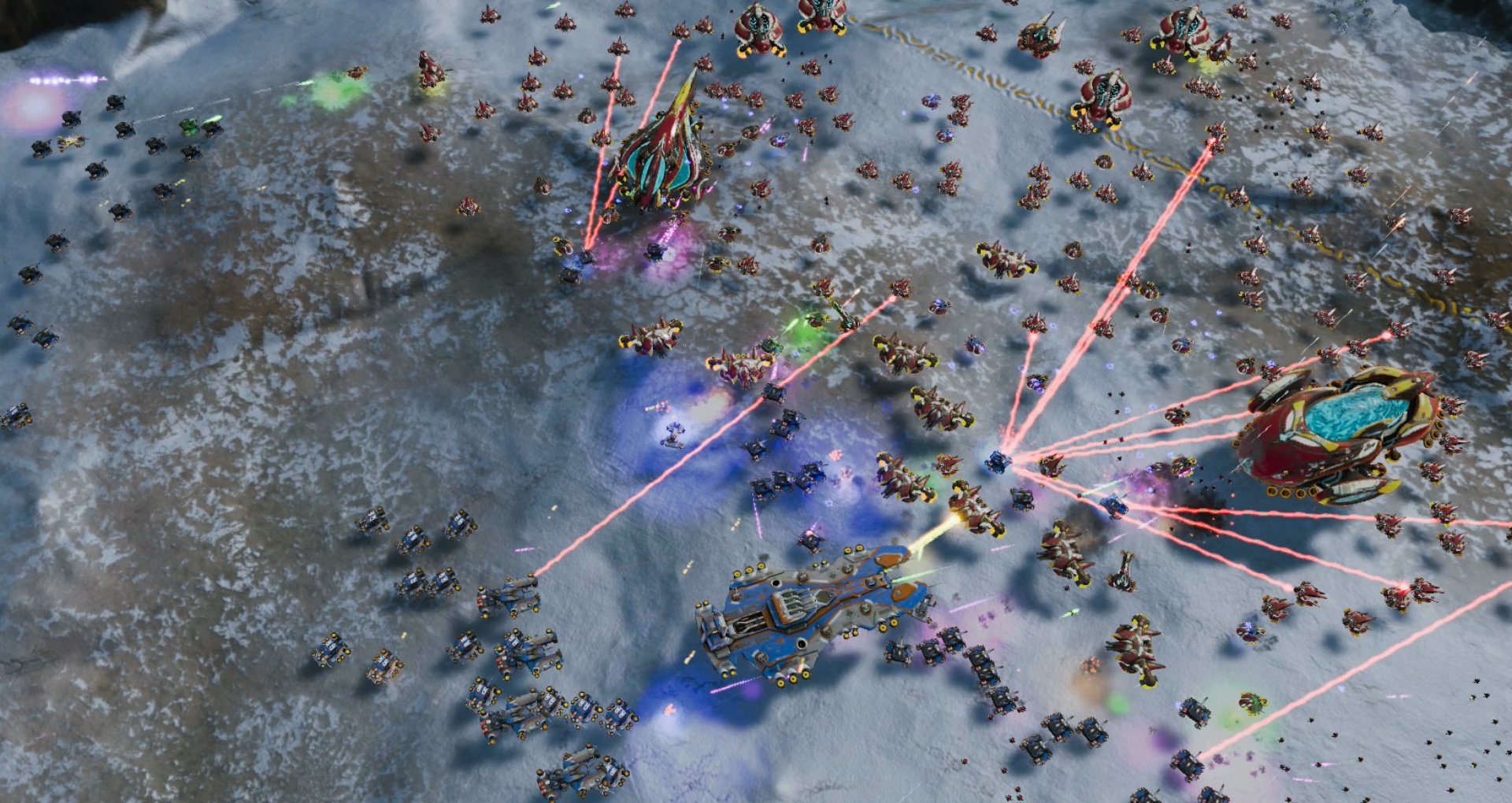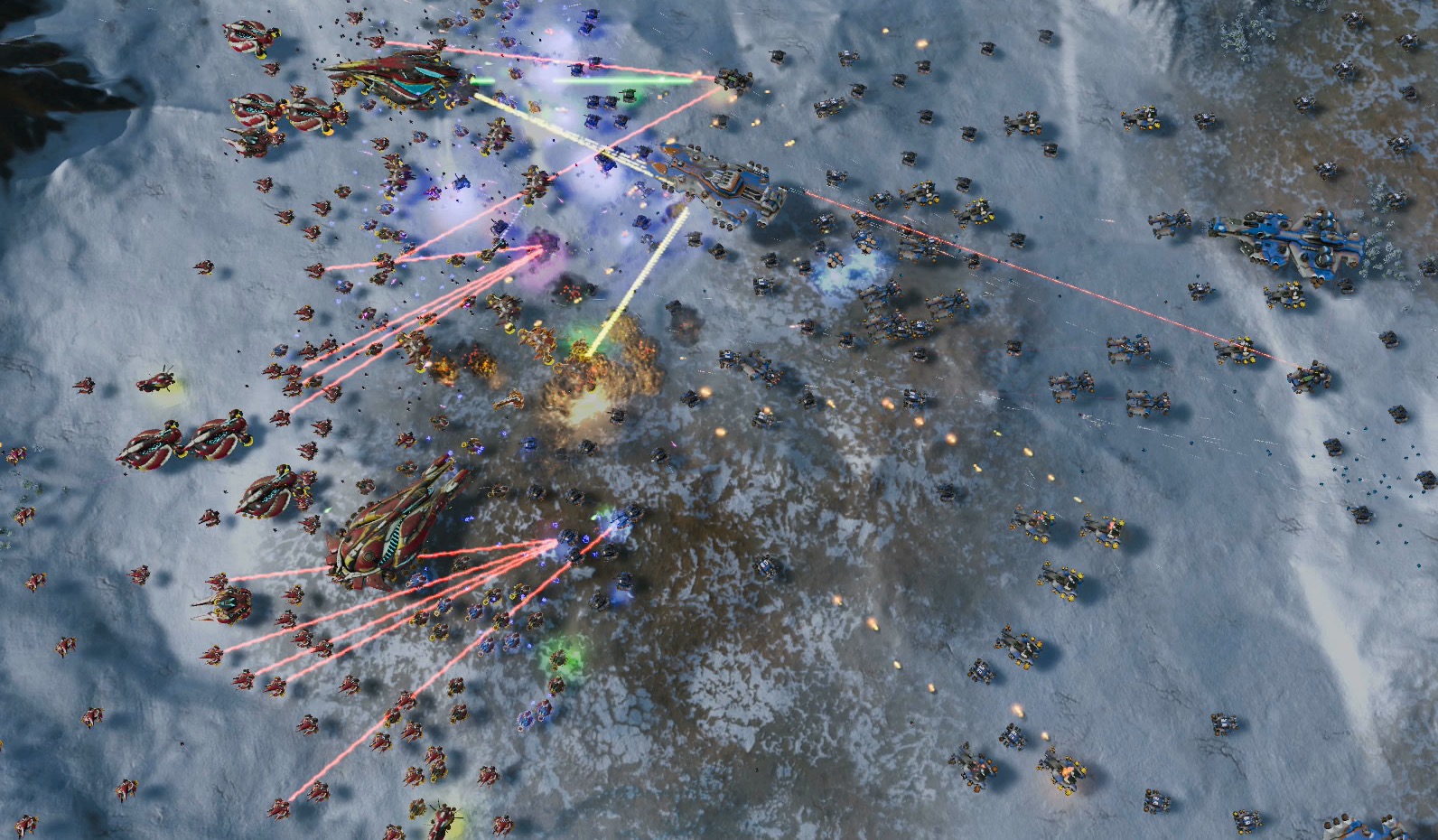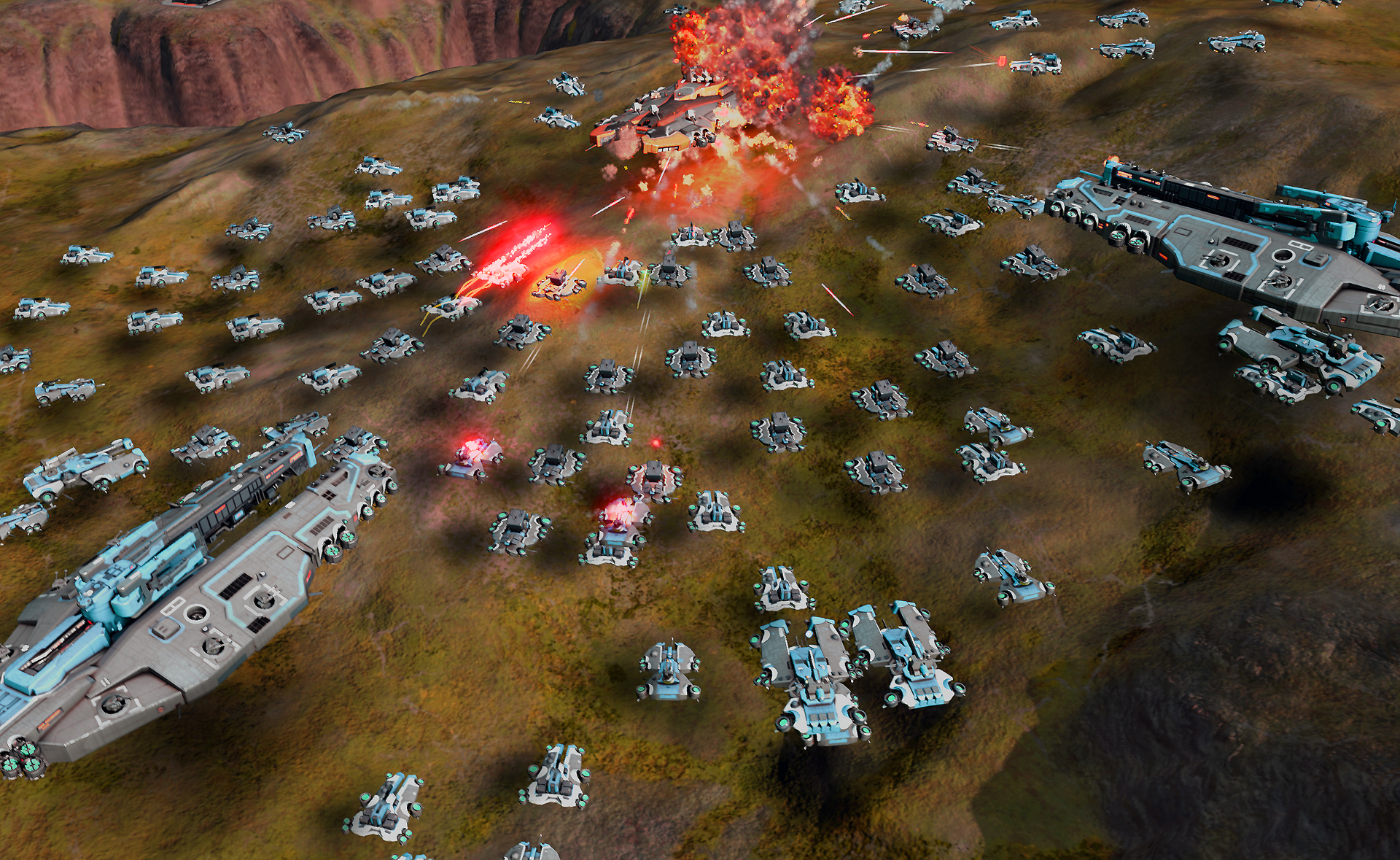Our Verdict
Ashes of the Singularity delivers thoughtful real-time strategy with tons of units in play, but drab maps and a poor story.
PC Gamer's got your back
What is it? A real-time strategy game that lets you build up thousands of units.
Expect to pay: $50/ £40
Developer: Oxide Games
Publisher: Stardock
Reviewed on: Windows 10, 16GB RAM, GeForce GTX 980
Multiplayer: Up to 6 players
Link: Official site
There's a point in Ashes of the Singularity when the benchmark simulation pulls out to showcase its Supreme Commander-style wide view, and the sight of all the flashy battles raging on the snow far below actually looks a little like simmering ashes. It's an apt image for Stardock's new game, which clearly sees itself as a phoenix of sorts for SupCom and the real-time strategy genre in general. For the most part it succeeds in spreading its wings, as it tosses out the speedy tactics known from the likes of StarCraft 2 in favor of a more determined, thoughtful approach and boldly enables carpeting the playing field with thousands of fighter planes, hovering battleships, and scrappy tanks. It's an RTS for pensive folks interested in the big picture, and even its slightly dorky name hints at its affection for brainpower, referencing Ray Kuzweil's conception of the moment when human intelligence transcends mere biology.
Too bad it doesn't spin a yarn that's worthy of its gaudy name. Ashes devotes a mere 11 missions to telling the tale of the future ‘Ascension War’ between the technologically augmented Post-Humans and the strange AI faction of the Substrate. The characters are as memorable as the back label of a Hershey's bar. There are YouTube ads more entertaining than the narrative, and victory rarely involves much more than nabbing more resources like metal and radioactives than the other team.

Cannon fodder
Adding to that blandness, each faction's 15 units look almost identical, although the Post-Humans' general durability and the Substrate's overall mobility nicely translate into vastly different strategies. And there's an advantage to those limited units: were there any more, they'd easily get lost in Ashes' controlled chaos.
Ashes is all about piling hundreds or even thousands of ships on the screen at once, ranging from flying bombers and small crafts skittering over the maps to lumbering, levelable dreadnoughts that laugh off small-scale attacks. It generally does a good job of it, too. I played with the DirectX 12 support enabled, and my GeForce GTX 980 had few problems running the camera over the busiest battles. It ran well when I zoomed in so close I could see the nicks on my ship's hulls, at which point the booms and pows of the cannons reverberate in my headphones with satisfying weight. It ran well when I pulled back to the heavens to watch the symphony of destruction from afar (although it never quite reaches SupCom's distances). The catch? I could only achieve an average of around 45 frames per second.
That rarely seemed to matter, though, as I discovered that dealing with that many units on screen demands shift from the speed-based strategies common to Ashes' few contemporary RTS cousins. Appropriately for its title, Ashes instead champions a slow burn. Reaching the point where I can cram my screen with hundreds of units usually takes a while, especially when the most powerful units creep over the battlefields with all the urgency of a snail, and I admit that early on I found the thought of refreshing my browser for a Half-Life 3 release date slightly more satisfying.

But that's the same side of me that got fidgety and distracted while playing chess and high school. I started enjoying Ashes when I learned to think how it wants me to think; when I started sending off dreadnoughts and small accompanying forces off to points they wouldn't reach for five minutes, all while I scoped out new deposits of resources like metal and radioactives with smaller, faster groups. As these resources queue infinitely once captured, securing them allowed me to focus on strategy rather than the tedium of worrying about depletion rates.
Elsewhere, I shook off my initial disappointment with the samey look of units once I realized I fared much better using a hotkey to treat a collection of them as one entity, a ‘meta unit.’ Sometimes the big battles devolve into a simple tug of war, but Ashes tends to reward players who look beyond the trenches, such as when I swatted away the generally smart AI's dreadnought assault with an array of long-range missiles I'd quietly built in anticipation. In the tightest spots, I sometimes took a dare and called down massively devastating orbital strikes, but despite their awesomeness, I found they were best used as a late stage bird-flipping when almost all hope is lost.
Keep up to date with the most important stories and the best deals, as picked by the PC Gamer team.
Ashes tends to reward players who look beyond the trenches.
The campaign delivers occasional bits of excitement in this vein, but Ashes' true soul lies in the Skirmish mode. Here the focus always centers on a mad rush for resources (including the all-important Turinium), and it's dazzlingly customizable and playable by up to six AI teams or players.Considering how liberally Ashes slathers the screen in units, it shouldn't work as well as it does, but I found it came into its own once I imagined the scattered squads as pieces on a giant board. Rather than bothering with endless busybody micromanagement, I focused on the flanking, the surprise flashes for Turinium, the carefully timed arrival of a dreadnought when my opponent expected none. And in the process, I found I was having more fun with an RTS than I have in a couple of years.
I say that with some qualifications. I never managed to shake the feeling that Ashes' drab maps rob it of an extra layer of strategy, and as a person whose favorite gaming stories have grown out of real-time strategy games, I frowned at the forgettable campaign. But in other moments, Ashes manages to rise beyond its lackluster parts and its muted landscapes to deliver carefully paced victories I won't soon forget.
Ashes of the Singularity delivers thoughtful real-time strategy with tons of units in play, but drab maps and a poor story.


